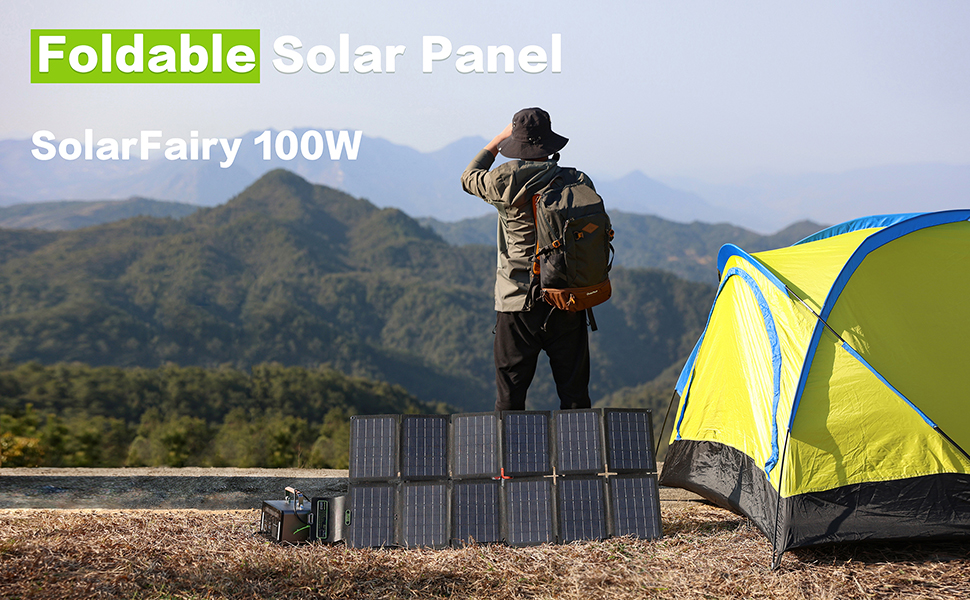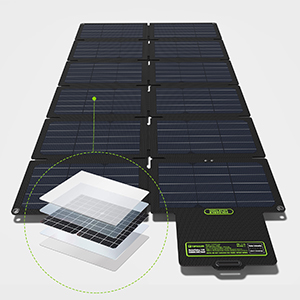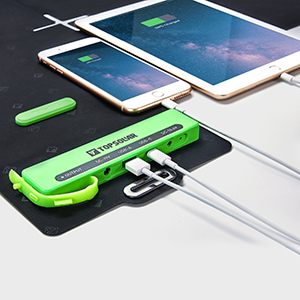Kampingtime.com is a participant in the Amazon Services LLC Associates Program, an affiliate advertising program designed to provide a means for sites to earn advertising fees by advertising and linking to Amazon properties including, but not limited to, amazon.com, endless.com, myhabit.com, smallparts.com, or amazonwireless.com.
| Compatible Devices | Tablets, Cameras, Laptops, Cellular Phones |
| Connectivity Technology | USB |
| Special Feature | Fast Charging |
| Connector Type | USB |
| Brand | Topsolar |
| Total USB Ports | 2 |
| Wattage | 100 watts |
| Power Source | Solar Powered |
| Item Weight | 5.1 Pounds |
| Current Rating | 2 Amps |
Safe Solar Panel
- Short Current Protection
- Surge Protection
- Over Power Protection
- FCC/ ROHS /CE Certification
Durable Solar Panel
- The solar panel is fully Laminated
- Made by advanced laminated technology and long lasting material
- Higher light transmittance
Portable & Foldable Solar Panel
- Because of the Portable and Compact Design, it can be folded into 20.2*15.1*1.7 inch
- Equipped with bag that is much easier to take it to explore more
Powering USB-A & USB-C Devices
- There are 2 USB Outputs Powering 2 USB Outdoor Devices
- USB-A:5V/3A,9V/2.5A,12V/2A (Supporting QC3.0)
- USB-C:5V/3A,9V/2.5A,12V/2A (Supporting QC3.0/PD3.0 Charging)
Specifications:
- Peak Power: 100 W
- Cell Efficiency: 23%
- Power Voltage: 19V
- Power Current: 4.5A
- Open Circuit Voltage: 24V±5%
- Weight(only panel):5.1Lb
- USB Outlets: 1*USB-A(5V, 3A), 1*USB-C(5V, 3A). Note: USB-C support PD charging.
Note:
1.Before test the 14.4V port voltage, need to connect a load/battery to activate.
2.Any questions,please let us konw.We will work to make you satisfied.
FAQ
Q1:Why the solar can not produce 100W power when charging to power station?
As we all know, the power generation of solar panels is affected by many factors. For example, the irradiance of light and the receiving angle of the panel. The rated power of 100W is the power tested under standard conditions (AM1.5, 25°C, 1000W/m2). Irradiance and temperature are the main factors that affect the power generation of solar panels. In the actual working environment, the irradiance and temperature are constantly changing, and there are also efficiency losses in mobile power station charging. It is impossible to charge 100% of solar power. Into the mobile power station. Therefore, the rated output power cannot be produced.
Q2:Why our solar panels are not compatible with Goalzero Yeti
In order to adapt to most of the mobile power stations on the market, the open circuit voltage of the solar panel is set to about 24V, while the adaptation voltage of Goalzero is narrow, only 12-22V. When Goalzero detects that the input voltage exceeds 22V, it will prohibit charging. . So it is not compatible (if you are a Goalzero user, please let us konw, we will give you a custom step-down box to reduce the voltage to 21V to fit your power station).
Q3: Why does the 14.4V port need to be activated to measure the voltage?
The 14.4V interface is a dedicated interface for battery charging. For safety reasons, this output is allowed to supply power only when the battery is detected.
Q4.Last but not least
In the previous upgrade, 100W SolarFairy were incompatible with some portable power station, and we have all been resolved and can compatible with most portable power station now.
I have a ton of rigid panels and few flexibles, even a couple folding panels in the lower wattage range. This was my first larger folding panel purchase and I was feeling discouraged while shopping reading so many reviews of dismal output from many top brands.
I’ve had this panel for a whopping 4 hours and just got it set up outside for a test. The sun isn’t perfectly overhead so these numbers may increase slightly, but I don’t plan to angle it or anything – flat is better than anything I could rig up given the position of the sun right now.
Immediately showed 74-75w being produced when connected to a Victron MPPT (see attached image). I expected this number to fall as the panel heated up – it’s 95* outside and it’s laying on hot plywood with no airflow beneath the panels, or from anywhere – perfectly still wind-free day.
So, 30 minutes later it’s producing 72w. The 2x100w series’d rigid panels on my truck are producing 143w right now and actually have good air flow. So I’d say the output of this panel is a lot better than what I’ve read of Dokios and similar, producing 60w from a “200w” folding panel.
It’s heavy but that’s okay, it rolls up tight and compact and feels more durable than my smaller folding panels. The smaller ones I have can be flexed but these feel like unfolding a book of floor tile, so that’s where the weight is coming from. No other comments on durability though, too soon to tell. Just feels like it’ll last. Unfolding it is straight forward, you just flip the 6 tiles open and then unfold the other 6 from on top of it. I liked that because I could unfold without having the panel producing any voltage until I flipped the last fold over – one side covers the other until this point. People who are familiar with throwing blankets over producing solar panels to halt current will understand and appreciate this.
The flap that hangs off the side where the output box (or whatever you want to call it) is ok, I previously thought it was stupid when shopping. Part of the flap has the output box and the other part is what wraps over the panels and velcros them shut when folded up. I don’t think you could use this panel hanging horizontally (landscape mode!) without that flap catching the wind and being obnoxious, and causing stress on the wires inside that lead to the flap. But would be easy to hang vertically with the flap hanging down.
If you review this item, try to observe the panel voltage and charge current going in to your battery. That’s useful info in a world of subpar folding panels that barely hit half their rated output.
Oh yeah, wires. Let’s talk wires. They’re terribly thin on all the accessories. I’m using a 10 amp 2.1×5.5mm jack as my solar inlet to my charge controller so I was able to use the included 2.1×5.5 extension cable. The MC4 adapter and alligator clip adapter are both like 22 gauge. It’s very possible the 2.1×5.5mm extension cable is also high gauge. I ordered a 16 gauge heavy duty 10ft 2.1×5.5 extension (but I’m realizing now I should have gotten a male to male – it hasn’t arrived yet). In any event, using as large of wire as possible from the panel’s output box to your charge controller is always recommended to curb voltage drop.
If you really want to give the panel the best shot at producing, get a 2.1×5.5mm male jack with screw terminals (they come in packs of 10) from Amazon and shove as large a wire as possible as you can in to them (12 gauge in my experience) and keep the wire as short as you can to reach where it needs to go. This will allow more voltage to flow through the wire at greater lengths and in high temps.
Ending review, this took me a while to type and its been at least another 30 minutes since I said it was producing 72w. It’s giving me 70w right now – barring a handful of days here in Colorado this is as hot as it’s going to get.
UPDATE after first trip: Took this to the mountains and laid it in the grass to charge up my LiFePO4 camper battery. Had to use their included 2.1×5.5mm extension cable again as the heavy duty one I ordered hadn’t arrived before I left town. This was going in to a Victron 75/15 MPPT charge controller. 72*F ambient temps and mostly clear skies. Didn’t bother angling it, and the grass wasn’t letting it lay perfectly flat either so it was a very slight bowl shape. Was watching the charge controller over bluetooth and about an hour in to charging I hit 80w for a while… covered in bugs (adding new pic). Would recommend.
After testing below on Nov 5th, the TP solar panel charged my solar generator from its remaining ~9,000mAh to completely full capacity of 45,000 mAh in 7 hours…3 hours prior to sunset
I began testing the TP Solar Panel at 1300 CST on November 5th by facing the panels directly at the sunlight and charging a 12V battery that was dormant for nearly 3 years. Sun elevation was 33.6 degrees and sun azimuth was 198 degrees. It was time to charge it up and test the panels. My initial reading was 21.28V and that was under scattered cloudy conditions. This was also while topping off my suunto ambit 3 run from 0% which achieved 100% in just over 2.5 hours while also charging the 12V battery.
I returned to the panels at 1530, optimized the panel angle and was able to achieve 21.17V. I continued to test the panels at varying positions and angles while reading my voltmeter. At 1600 CST the suns altitude was 11.5 degrees at an azimuth of 238 degrees. The panel registered 20.40V when laying flat and 21.66V when angled directly at the sun.
Our local sunset time is 1710, and at 1628 the panels were obscured by the shadows of the surrounding homes. Yet, the energy continued to generate with 20.31V (while also under scattered skies). With no direct sunlight I continued testing the panels. When directed towards the sunlit skies the voltmeter registered 19.99V, laying flat it read 19.52V. Over all the battery was charged to 5.87V from ZERO in appx 4 hours!!!
The following are times with their respective volt readings. Local temperature was 48 degrees, elevation 800 feet, barometric pressure 30.25inHg, sun elevation 5 degrees, sun azimuth 245 degrees, scattered clouds, humidity 57%, panels receiving ZERO direct sunlight, all times are CST:
1645 – 19.45V
1649 – 18.94V
1700 – 17.10V
1705 – 9.10V
1710 – 7.08V
Okay, enough geek speak. These panels are freaking AWESOMELY WICKED!!! When laying flat and facing directly skyward with the sun teetering on the horizon I still captured 20+ volts. Are you kidding!?!?! Not only that I managed to charge my iPad, and Suunto to 100% and edge in 5.87 Volts on a battery that sat dormant for over three years.
I have tested and used this product to re-charge a couple of 12V batteries (one 12 amp hour, and one 100 amp hour). I think it would have done fine with the included 14.5V “charging box”, but I purchased a 10amp solar controller by SUNER POWER (waterproof) and various fittings (about another $50 in total, including a female cigarette charger – see below) to more fully utilize the 100W capacity of this solar panel. The 14.5V “charging box” is a safe way to make sure you don’t overcharge a 12V battery, but it also acts as a throttle to prevent overcharging (safety at the cost of speed). With some research and “know how”, you can find the fittings you need to incorporate a solar charge controller.
This is way more power than needed for charging cell phones and smaller electronics. If that’s all you need, save money and look for something smaller.
The other reviews are accurate: It appears durable (for sure), easy to clean, etc. It’s a very convenient size when folder and stowed – that was one selling feature for me. The panel is waterproof, but I’m not sure the connections are. I think they would be okay in an unexpected light rain shower, but to be safe you’ll definitely want to keep the connections covered at the output “box” from the panel (which can be done with the “flap” that wraps the folded panels when stowed). There is a rubber flap over the connection points at the “box” from the panel, but those would naturally be “open” if you are plugged in during a rain. You don’t want water in that “box”!
If I were to ask for more, I wonder why there isn’t a female cigarette lighter plug (it comes with a male plug)? That one confused me, but I was able to find one separately on Amazon. It would also be great if there were a solar controller to maximize the output of the panels for 12V charging, but I’m sure that would add to the cost, too, and some buyers may not need that application.
Originally posted 2022-02-01 22:12:24.

















